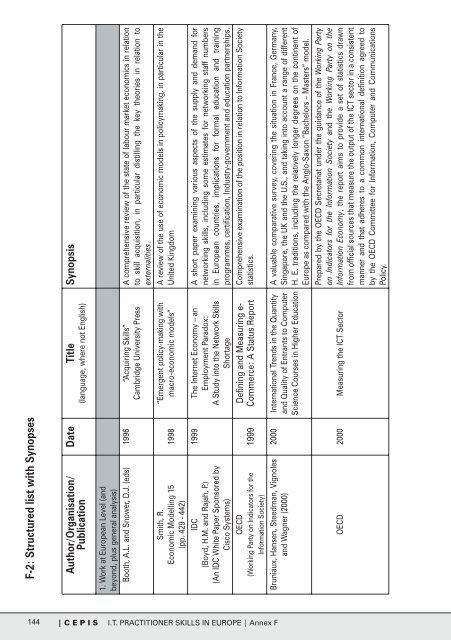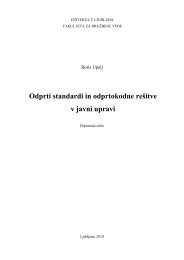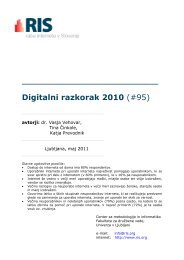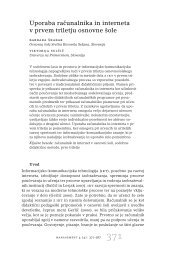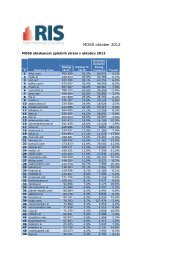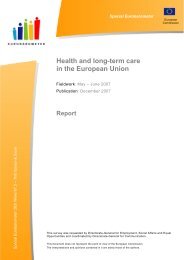the Labour Market Survey Report - Council of European ...
the Labour Market Survey Report - Council of European ...
the Labour Market Survey Report - Council of European ...
You also want an ePaper? Increase the reach of your titles
YUMPU automatically turns print PDFs into web optimized ePapers that Google loves.
F-2: Structured list with Synopses<br />
Author/Organisation/<br />
Publication<br />
Date Title<br />
(language, where not English)<br />
1. Work at <strong>European</strong> Level (and<br />
beyond, plus general analysis)<br />
Booth, A.L. and Snower, D.J. (eds) 1996 “Acquiring Skills”<br />
Cambridge University Press<br />
Smith, R.<br />
Economic Modelling 15<br />
(pp. 429 - 442)<br />
IDC<br />
(Boyd, H.M. and Rajah, P.)<br />
(An IDC White Paper Sponsored by<br />
Cisco Systems)<br />
OECD<br />
(Working Party on Indicators for <strong>the</strong><br />
Information Society)<br />
Bruniaux, Hansen, Steedman, Vignoles<br />
and Wagner (2000)<br />
1998<br />
“Emergent policy-making with<br />
macro-economic models”<br />
1999 The Internet Economy – an<br />
Employment Paradox:<br />
A Study into <strong>the</strong> Network Skills<br />
Shortage<br />
1999<br />
Defining and Measuring e-<br />
Commerce: A Status <strong>Report</strong><br />
2000 International Trends in <strong>the</strong> Quantity<br />
and Quality <strong>of</strong> Entrants to Computer<br />
Science Courses in Higher Education<br />
OECD 2000 Measuring <strong>the</strong> ICT Sector<br />
Synopsis<br />
A comprehensive review <strong>of</strong> <strong>the</strong> state <strong>of</strong> labour market economics in relation<br />
to skill acquisition, in particular distilling <strong>the</strong> key <strong>the</strong>ories in relation to<br />
externalities.<br />
A review <strong>of</strong> <strong>the</strong> use <strong>of</strong> economic models in policymaking, in particular in <strong>the</strong><br />
United Kingdom<br />
A short paper examining various aspects <strong>of</strong> <strong>the</strong> supply and demand for<br />
networking skills, including some estimates for networking staff numbers<br />
in <strong>European</strong> countries, implications for formal education and training<br />
programmes, certification, Industry-government and education partnerships.<br />
Comprehensive examination <strong>of</strong> <strong>the</strong> position in relation to Information Society<br />
statistics.<br />
A valuable comparative survey, covering <strong>the</strong> situation in France, Germany,<br />
Singapore, <strong>the</strong> UK and <strong>the</strong> U.S., and taking into account a range <strong>of</strong> different<br />
H. E. traditions, including <strong>the</strong> relatively longer degrees on <strong>the</strong> continent <strong>of</strong><br />
Europe as compared with <strong>the</strong> Anglo-Saxon ”Bachelors – Masters” model.<br />
Prepared by <strong>the</strong> OECD Secretariat under <strong>the</strong> guidance <strong>of</strong> <strong>the</strong> Working Party<br />
on Indicators for <strong>the</strong> Information Society and <strong>the</strong> Working Party on <strong>the</strong><br />
Information Economy, <strong>the</strong> report aims to provide a set <strong>of</strong> statistics drawn<br />
from <strong>of</strong>ficial sources that measure <strong>the</strong> output <strong>of</strong> <strong>the</strong> ICT sector in a consistent<br />
manner and that adheres to a common international definition agreed to<br />
by <strong>the</strong> OECD Committee for Information, Computer and Communications<br />
Policy.<br />
144<br />
| C E P I S I.T. PRACTITIONER SKILLS IN EUROPE | Annex F


